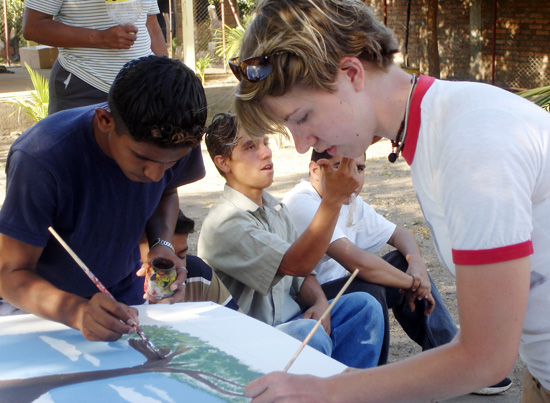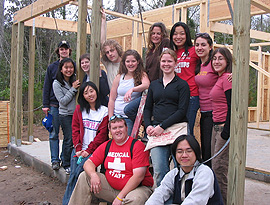No Break this Spring: Wesleyan Students Donate Time-Off to Help Others
 |
|
At right, Jessica French Smith 09, paints a mural with students from Nagarote, Nicaragua. She was one of more than 100 Wesleyan students who volunteered their spring break time to help others around the nation and world. |
| Posted 04/01/06 |
 Jane Maxson 06 spent her spring break on the gulf coast; however she wasnt sporting a sun hat and flip-flops on the beach. Equipped with a hammer, nails and tool belt, Maxson spent her time-off school volunteering for hurricane relief efforts. Jane Maxson 06 spent her spring break on the gulf coast; however she wasnt sporting a sun hat and flip-flops on the beach. Equipped with a hammer, nails and tool belt, Maxson spent her time-off school volunteering for hurricane relief efforts.
Maxon was one of over 100 Wesleyan students and faculty volunteering world-wide during break. Helping the Hurricane Victims Maxon and 50 other students, many of whom are Wesleyan Christian Fellowship members, teamed up with Willing Hearts, Helping Hands, a Christian ministry aiming to rebuild 200 houses in hurricane-affected areas. The students left March 11 and returned March 18. They aided victims on the Mississippi coast. As part of their project, the Christian Fellowship members sought to explore the intersections of faith and service, specifically how faith motivates service. We spent the days doing relief work and the evenings discussing the Christian motivation for serving the poor, the idea of meeting needs in a holistic way and the specific cases and challenges associated with Hurricane Katrina, explains Jane Maxson 06. I had a fantastic time, and I don’t think I could have had a more enjoyable time doing anything else. Another 50-plus students went directly to the hurricanes path of wrath in New Orleans. They were housed in and around a Catholic school in the hardest-hit Upper Ninth Ward that had been converted into a base of operations for the organization they worked for, Common Ground Relief. Some students slept in classrooms, while others slept in tents outside. Brian Thorpe 07 spent nine days in the shattered city armed with crowbars, shovels, Untold amounts of people in neighborhoods are still suffering from the effects of Katrina, Thorpe says. The raw truth is that seven months after the hurricane there is still precious little being done by the state, local, and especially federal government to rebuild the city and help the poorer citizens of the area to get back on their feet. Yet while I came back from New Orleans frustrated and disheartened, I still felt hopeful to see so many people my own age giving up their time and money to go down and help. Developing Wesleyan Partnership in Nicaragua Jessica French Smith ’09, Kevin Young ’07, and Octavio Flores, adjunct associate professor of Romance Languages and Literatures went to Nagarote, Nicaragua as part of Wesleyan in Nicaragua (WIN) organization for 10 days. WIN is partnered with The Norwalk-Nagarote Sister City Project and together, the groups planned and to participated in community service activities which benefit the people of Nagarote. The trio stayed for 10 days, living with local families, researching for future Wesleyan initiatives, meeting with teachers, members of the Ministry of Education and the Norwalk/Nagarote This was French Smiths third time going to Nicaragua to do service work, and shes already promised to return next year. Knowing that there are people all over the world living in horribly unjust conditions keeps me working hard to take advantage of the resources available to me and to use these resources to help others as much as possible, she says. Besides, its a much more satisfying alternative to Cancun. I don’t think anyone cries when they leave Cancun because they are going to miss their host family, or because they couldn’t stay longer and work harder. French Smith says there is a lot of potential for other Wesleyan students to work in help, even remotely. The group met with met with community leaders, teachers and members of the Board of Education and found that in the future there is a definite need for both didactic and consumable teaching materials. She hopes students can help with the development/fundraising for these materials. French Smith says this was not a one-time kind of trip, but rather one designed toward building an ongoing relationship necessary to successful service work. I met so many incredible and loving people in Nicaragua and I learned a lot about myself and my personal philosophies concerning service-work, French Smith says. I definitely know that it is something all Wesleyan students should have to opportunity to get involved in, work for, and experience in the future and this is something I’m going to be working toward back on campus. A dozen students involved with Wesleyan Habitat for Humanity went to Georgetown, South Carolina to help build a Habitat House for nine days. Georgetown is a rural, poor area on the South Carolina coast with a large population of people living in substandard housing. Mark Purser 08 says the tip allowed several students who had never been to the South to experience its unique culture. The trips purpose was to give students an opportunity to spend their spring break participating in community service as well as learn about substandard housing and poverty in America, he says. The student worked on two Habitat houses, constructing and raising interior walls, sheeting the exterior walls and installing insulation. Improving Childrens Lives in Mexico In addition, nine students traveled to Oaxaca, Mexico over spring break to participate in a community service project. The helped build a structure that will house Cala y Emes, a group in Oaxaca whose mission is to help young people with special needs develop skills to enter the work force. This is a brand new organization that hopes to not only improve the lives of the kids they support, but also to educate/re-program the Oaxacan community about people with special needs. The Wesleyan students helped clear donated land, poured the buildings foundation, and installed sinks, drainage and other necessities. Cathy Crimmins Lechowicz, director of the Office of Community Service and Volunteerism at Wesleyans Center for Community Partnerships is impressed by the diverse range of projects dealing with economic development, hurricane relief, housing and long-term partnership building. She hopes to work with the students to share their experience for the entire Wesleyan community. I’ve been thoroughly impressed by the interest, motivation and dedication of the students organizing and going on the trips, Crimmins Lechowicz says. These immersion experiences can have a powerful impact on student’s perspective on issues. |
| By Olivia Drake, Wesleyan Connection editor |


 Building Homes in South Carolina
Building Homes in South Carolina